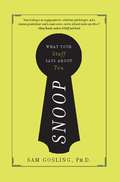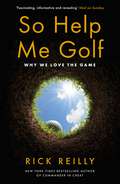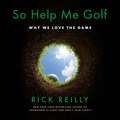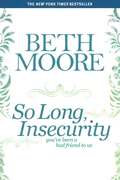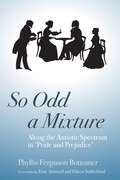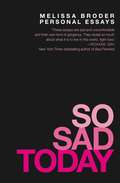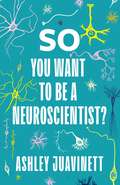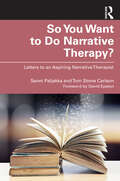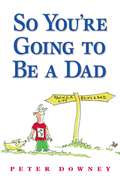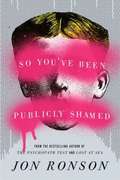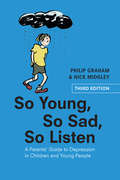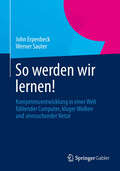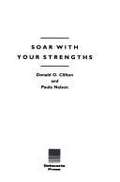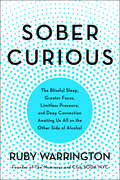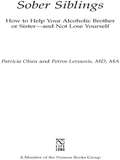- Table View
- List View
Snoop: What Your Stuff Says About You
by Sam GoslingDo the things on your desk betray the thoughts on your mind? Does your dining room décor carry clues to your character? Award-winning psychologist Sam Gosling has dispatched teams of scientific investigators to poke around bedrooms and offices, check out iPods, and peek at personal websites--to see what can be learned about us simply from looking at our belongings. What he has discovered is intriguing: When it comes to the most essential components of our personality--from friendliness and flexibility to openness and originality--the things we own and the way we arrange them can say more about who we are than even our most intimate conversations. <p><p> Packed with original research and a wealth of fascinating stories, Snoop is a captivating guide to our not-so-secret selves, and reveals how intensely connected we are to the places in which we live and work.<p> <i>Advisory: Bookshare has learned that this book offers only partial accessibility. We have kept it in the collection because it is useful for some of our members. To explore further access options with us, please contact us through the Book Quality link on the right sidebar. Benetech is actively working on projects to improve accessibility issues such as these. </i>
So Help Me Golf: Why We Love the Game
by Rick ReillyThis is the book Rick Reilly has been writing in the back of his head since he fell in love with the game of golf at eleven years old. He unpacks and explores all of the wonderful, maddening, heart-melting, heart-breaking, cool, and captivating things about golf that make the game so utterly addictive. We meet the PGA Tour player who robbed banks by night to pay his motel bills, the golf club maker who takes weekly psychedelic trips, and the caddy who kept his loop even after an 11-year prison stint. We learn how a man on his third heart nearly won the U.S. Open, how a Vietnam POW saved his life playing 18 holes a day in his tiny cell, and about the course that's absolutely free.We'll visit the eighteen most unforgettable holes around the world (Reilly has played them all), including the hole in Indonesia where the biggest hazard is monkeys, the one in the Caribbean that's underwater, and the one in South Africa that requires a shot over a pit of alligators; not to mention Reilly's attempt to play the most mini-golf holes in one day. Reilly will admire and unload on all the great figures in the game, from Phil Mickelson to Bobby Jones to the simple reason Jack Nicklaus is better than Tiger Woods. Reilly will explain why we should stop hating Bryson DeChambeau unless we hate genius, the greatest upset in women's golf history, and why Ernie Els throws away every ball that makes a birdie. Plus all the Greg Norman stories Reilly has never been able to tell before. Connecting it all will be the story of Reilly's own personal journey through the game, especially as it connects to his tumultuous relationship with his alcoholic father, and how the two eventually reconciled through golf. This is Reilly's valentine to golf, a cornucopia of stories that no golfer will want to be without.
So Help Me Golf: Why We Love the Game
by Rick ReillyThis is the book Rick Reilly has been writing in the back of his head since he fell in love with the game of golf at eleven years old. He unpacks and explores all of the wonderful, maddening, heart-melting, heart-breaking, cool, and captivating things about golf that make the game so utterly addictive. We meet the PGA Tour player who robbed banks by night to pay his motel bills, the golf club maker who takes weekly psychedelic trips, and the caddy who kept his loop even after an 11-year prison stint. We learn how a man on his third heart nearly won the U.S. Open, how a Vietnam POW saved his life playing 18 holes a day in his tiny cell, and about the course that's absolutely free.We'll visit the eighteen most unforgettable holes around the world (Reilly has played them all), including the hole in Indonesia where the biggest hazard is monkeys, the one in the Caribbean that's underwater, and the one in South Africa that requires a shot over a pit of alligators; not to mention Reilly's attempt to play the most mini-golf holes in one day. Reilly will admire and unload on all the great figures in the game, from Phil Mickelson to Bobby Jones to the simple reason Jack Nicklaus is better than Tiger Woods. Reilly will explain why we should stop hating Bryson DeChambeau unless we hate genius, the greatest upset in women's golf history, and why Ernie Els throws away every ball that makes a birdie. Plus all the Greg Norman stories Reilly has never been able to tell before. Connecting it all will be the story of Reilly's own personal journey through the game, especially as it connects to his tumultuous relationship with his alcoholic father, and how the two eventually reconciled through golf. This is Reilly's valentine to golf, a cornucopia of stories that no golfer will want to be without.(P) 2022 Hachette Audio
So Long, Insecurity: You've Been A Bad Friend To Us
by Beth MoorePerhaps one of the biggest issues all women face is their own insecurity. Beth Moore, one of today's most admired and trusted Christian writers, wants women to be free from the insecurity trap. So Long, Insecurity will strike a chord with women everywhere, as Beth speaks truth into the lives of listeners, showing them how to deal with their innermost fears, rediscover their God-given dignity, and develop a whole new perspective - a stronger sense of self. Women of all ages and backgrounds will resonate with this message of security and discover truths that will free them emotionally and spiritually and lead them to a better life as they walk with God.
So Much Wasted: Hunger, Performance, and the Morbidity of Resistance
by Patrick AndersonIn So Much Wasted, Patrick Anderson analyzes self-starvation as a significant mode of staging political arguments across the institutional domains of the clinic, the gallery, and the prison. Homing in on those who starve themselves for various reasons and the cultural and political contexts in which they do so, he examines the diagnostic history of anorexia nervosa, fasts staged by artists including Ana Mendieta and Marina Abramović, and a hunger strike initiated by Turkish prisoners. Anderson explores what it means for the clinic, the gallery, and the prison when one performs a refusal to consume as a strategy of negation or resistance, and the ways that self-starvation, as a project of refusal aimed, however unconsciously, toward death, produces violence, suffering, disappearance, and loss differently from other practices. Drawing on the work of Martin Heidegger, Sigmund Freud, Giorgio Agamben, Peggy Phelan, and others, he considers how the subject of self-starvation is refigured in relation to larger institutional and ideological drives, including those of the state. The ontological significance of performance as disappearance constitutes what Anderson calls the "politics of morbidity," the embodied, interventional embrace of mortality and disappearance not as destructive, but rather as radically productive stagings of subject formations in which subjectivity and objecthood, presence and absence, and life and death are intertwined.
So Odd a Mixture: Along the Autistic Spectrum in 'Pride and Prejudice'
by Anthony Attwood Phyllis Ferguson-BottomerAutism was not a recognised disorder in Jane Austen's lifetime, nor for well over a century after her death. However there were certainly people who had autism, and Phyllis Ferguson Bottomer proposes that Austen wrote about them, without knowing what it was that she was describing. So Odd a Mixture looks at eight seemingly diverse characters in Austen's classic novel, Pride and Prejudice, who display autistic traits. These characters - five in the Bennet family and three in the extended family of the Fitzwilliams - have fundamental difficulties with communication, empathy and theory of mind. Perhaps it is high-functioning autism or Asperger's Syndrome that provides an explanation for some characters' awkward behaviour at crowded balls, their frequent silences or their tendency to lapse into monologues rather than truly converse with others. This fascinating book will provide food for thought for students and fans of Austen's classic novel, and for anyone interested in autism spectrum disorders.
So Sad Today: Personal Essays
by Melissa Broder"These essays are sad and uncomfortable and their own kind of gorgeous. They reveal so much about what it is to live in this world, right now." --Roxane Gay, New York Times bestselling author of Bad FeministFrom acclaimed poet and creator of the popular Twitter account @sosadtoday comes a darkly funny and brutally honest collection of essays.Melissa Broder always struggled with anxiety. In the fall of 2012, she went through a harrowing cycle of panic attacks and dread that wouldn't abate for months. So she began @sosadtoday, an anonymous Twitter feed that allowed her to express her darkest feelings, and which quickly gained a dedicated following. In SO SAD TODAY, Broder delves deeper into the existential themes she explores on Twitter, grappling with sex, death, love low self-esteem, addiction, and the drama of waiting for the universe to text you back. With insights as sharp as her humor, Broder explores--in prose that is both ballsy and beautiful, aggressively colloquial and achingly poetic--questions most of us are afraid to even acknowledge, let alone answer, in order to discover what it really means to be a person in this modern world.
So You Want to Be a Neuroscientist?
by Ashley JuavinettThe pursuit to understand the human brain in all its intricacy is a fascinatingly complex challenge and neuroscience is one of the fastest-growing scientific fields worldwide. There is a wide range of career options open to those who wish to pursue a career in neuroscience, yet there are few resources that provide students with inside advice on how to go about it.So You Want to Be a Neuroscientist? is a contemporary and engaging guide for aspiring neuroscientists of diverse backgrounds and interests. Fresh with the experience of having recently launched her own career, Ashley Juavinett provides a candid look at the field, offering practical guidance that explores everything from programming to personal stories.Juavinett begins with a look at the field and its history, exploring our evolving understanding of how the brain works. She then tackles the nitty-gritty: how to apply to a PhD program, the daily life of a graduate student, the art of finding mentors and collaborators, and what to expect when working in a lab. Finally, she introduces readers to diverse young scientists whose career paths illustrate what you can do with a neuroscience degree. For anyone intrigued by the brain or seeking advice on how to further their ambitions of studying it, So You Want to Be a Neuroscientist? is a practical and timely overview of how to learn and thrive in this exciting field.
So You Want to Do Narrative Therapy?: Letters to an Aspiring Narrative Therapist
by Tom Stone Carlson Sanni PaljakkaSo You Want to Do Narrative Therapy? is an engaging and accessible introduction to contemporary narrative therapy practice. Each of the ten chapters is written in the series of letters personally addressed to a real student who is learning how to do narrative therapy at a narrative therapy agency. Each letter highlights the most useful discoveries during the authors’ years of practicing in a narrative therapy agency, both as a therapist and as supervisors. Each letter also contains transcripts from therapy sessions showing the principles and practices in action and ends with a therapeutic poem that was given to the client based on their own words from a therapy session. While written for narrative therapists at any level of experience, this book is especially useful for graduate-level theory courses in therapy training programs in counseling, psychology, social work, and family therapy.
So You're 70! (So You're ... Ser.)
by Clive Whichelow Mike Haskinshttp://www.stisonbooks.com/images/books/native/9780857655851
So You're 70! (So You're ... Ser.)
by Clive Whichelow Mike Haskinshttp://www.stisonbooks.com/images/books/native/9780857655851
So You're Going To Be a Dad
by Peter DowneyFor the first-time dad, useful and practical information about pregnancy, childbirth, and baby care, including: what to say--and what not to say--when you hear the news; taking care of moms-to-be; what childbirth feels like; crying, diapers, and bathtime; and baby-proofing the home.
So You're Going To Be a Dad
by Peter DowneyFor the first-time dad, useful and practical information about pregnancy, childbirth, and baby care, including: what to say--and what not to say--when you hear the news; taking care of moms-to-be; what childbirth feels like; crying, diapers, and bathtime; and baby-proofing the home.
So You're Going To Be a Dad
by Peter DowneyFor the first-time dad, useful and practical information about pregnancy, childbirth, and baby care, including: what to say--and what not to say--when you hear the news; taking care of moms-to-be; what childbirth feels like; crying, diapers, and bathtime; and baby-proofing the home.
So You've Been Publicly Shamed
by Jon RonsonFrom the New York Times bestselling author of The Psychopath Test, a captivating and brilliant exploration of one of our world's most underappreciated forces: shame. 'It's about the terror, isn't it?' 'The terror of what?' I said. 'The terror of being found out.' For the past three years, Jon Ronson has travelled the world meeting recipients of high-profile public shamings. The shamed are people like us - people who, say, made a joke on social media that came out badly, or made a mistake at work. Once their transgression is revealed, collective outrage circles with the force of a hurricane and the next thing they know they're being torn apart by an angry mob, jeered at, demonized, sometimes even fired from their job. A great renaissance of public shaming is sweeping our land. Justice has been democratized. The silent majority are getting a voice. But what are we doing with our voice? We are mercilessly finding people's faults. We are defining the boundaries of normality by ruining the lives of those outside it. We are using shame as a form of social control. Simultaneously powerful and hilarious in the way only Jon Ronson can be, So You've Been Publicly Shamed is a deeply honest book about modern life, full of eye-opening truths about the escalating war on human flaws - and the very scary part we all play in it.From the Hardcover edition.
So Young, So Sad, So Listen: A Parents' Guide to Depression in Children and Young People
by Philip Graham Nicholas MidgleyHas your daughter lost her sparkle? Has everyday life become a trial for your son? This book, written by two experts in child and adolescent mental health, describes how to recognise depression and what causes it; and provides guidance on how parents can support their child, including up-to-date advice on seeking professional help. It gives advice on how to tell the difference between normal responses to stress and symptoms that are more concerning. It covers topical issues such as academic pressure, social media, getting a grip on screen time and cyber-bullying. You will also be given information about the different treatment options provided by child and adolescent mental health services, as well as practical advice and information about the support you can give at home.
So werden wir lernen!
by John Erpenbeck Werner SauterWie werden wir in zehn Jahren beruflich - betrieblich lernen? In welcher Weise werden wir dann die vielfältigen neuen Möglichkeiten der Lerntechnologie und des sozialen Lernens im Web nutzen, die sich schon heute andeuten? In den kommenden zehn Jahren werden Computer zu aktiven Lernpartnern, die Kompetenzentwicklungsprozesse ermöglichen und tutoriell begleiten. Dabei sind drei Trends von wesentlicher Bedeutung: * Die Entfaltung semantischer Netze im Rahmen von Kompetenzentwicklungsprozessen, * die zunehmende Einbeziehung des Cloud Computing in betriebliche Lernsysteme, * die Nutzung immer leistungsfähigerer "humanoider" Computer als Tandempartner beim selbstorganisierten Kompetenzaufbau. Die Autoren analysieren diese Entwicklungen. Sie leiten Trends für das Lernen in der Zukunft ab und entwickeln Anwendungsvorschläge für die Kompetenzentwicklung mit dem "Lernpartner Computer". Sie prognostizieren, wie sich Lernräume und Lernkulturen in Unternehmen schrittweise auf diese kommenden Veränderungen hin entwickeln werden und leiten daraus konkrete Handlungsempfehlungen für die Gestaltung der aktuellen Lernsysteme ab.
Soar with Your Strengths
by Donald O. Clifton Paula NelsonA groundbreaking, inspiring book for businesses, managers, and individuals on how to achieve the absolute best by focusing on strengths and steering away from weaknesses, this revolutionary, humanistic approach to business will transform companies, build careers, and change lives.
Soar: A Memoir
by Gail Campbell Woolley&“This is a book about life—about living it ravenously, fully, joyously, unendingly, even if you have a death sentence.&” —Donna Brazile, former chair, Democratic National Committee When Gail Campbell Woolley was seven, a pediatrician told her mother that Gail suffered from sickle cell anemia, a rare blood disease, and that she would be dead by age thirty-five. While others may have responded to this horrifying news by descending into a fog of self-pity, Gail went in the opposite direction. She decided to live an eventful, exciting life that ultimately included—despite a troubled home life and the systemic racism and sexism of the late twentieth century—academic success, an impressive career, a long and loving marriage, and the ability to leave her unmistakable stamp on every person she met. By the time she finally succumbed to her disease at age fifty-eight in 2015, she had ground that doctor&’s words into dust. Soar, written in the last two years of her life, is Woolley&’s powerfully inspiring story, and its publication checks the last item off her extraordinary bucket list, which also included traveling to every continent except Antarctica. Written in an engaging, no-nonsense voice with a directness that reflects her many years in journalism, Woolley&’s remarkable story not only will move readers to root for this irrepressible, quietly heroic woman but also will push readers to reassess their own approach to life. &“An inspiration for anyone confronting life&’s challenges. Gail has left a legacy of courage and compassion, and her memoir represents a voice that desperately needs to be heard in America right now.&” —Marc Morial, president and CEO, National Urban League
Sober Curious: The Blissful Sleep, Greater Focus, Limitless Presence, and Deep Connection Awaiting Us All on the Other Side of Alcohol
by Ruby WarringtonWould life be better without alcohol?It’s the nagging question more and more of us are finding harder to ignore, whether we have a “problem” with alcohol or not. After all, we yoga. We green juice. We meditate. We self-care. And yet, come the end of a long work day, the start of a weekend, an awkward social situation, we drink. One glass of wine turns into two turns into a bottle. In the face of how we care for ourselves otherwise, it’s hard to avoid how alcohol really makes us feel… terrible. How different would our lives be if we stopped drinking on autopilot? If we stopped drinking altogether? Really different, it turns out. Really better. Frank, funny, and always judgment free, Sober Curious is a bold guide to choosing to live hangover-free, from Ruby Warrington, one of the leading voices of the new sobriety movement. Drawing on research, expert interviews, and personal narrative, Sober Curious is a radical take down of the myths that keep so many of us drinking. Inspiring, timely, and blame free, Sober Curious is both conversation starter and handbook—essential reading that empowers readers to transform their relationship with alcohol, so we can lead our most fulfilling lives.
Sober Mama: Breaking Free from the Bottle: A Woman’s Journey to Sobriety and Practical Tips for Quitting
by Rachael ShephardFrom boozy benders to finding the joy of sobriety, Sober Mama tells the story of one woman's rollercoaster ride to abstinence and how it transformed her life. Through honest, relatable and outrageously funny anecdotes, Rachael shares her personal journey and offers practical guidance for anyone wanting to quit drinking.
Sober Mama: Breaking Free from the Bottle: A Woman’s Journey to Sobriety and Practical Tips for Quitting
by Rachael ShephardFrom boozy benders to finding the joy of sobriety, Sober Mama tells the story of one woman's rollercoaster ride to abstinence and how it transformed her life. Through honest, relatable and outrageously funny anecdotes, Rachael shares her personal journey and offers practical guidance for anyone wanting to quit drinking.
Sober Siblings: How to Help Your Alcoholic Brother or Sister-and Not Lose Yourself
by Patricia OlsenAn empowering, practical guide to help the brothers and sisters of alcoholics-by a journalist and sibling of two alcoholics, and an addiction specialist
Sobre el amor: ¿Por qué el amor es amor? Las claves artísticas y psicológicas del sentimiento más universal
by Jonah LehrerEn Sobre el amor, Jonah Lehrer entreteje estudios científicos de psicología, análisis profundos sobre la salud y la felicidad, relatos históricos y personajes literarios, manuales sobre la crianza de los hijos y el lenguaje de las webs de citas para examinar en profundidad el impulso más misterioso e importante que determina y mueve nuestras vidas. El mito más peligroso sobre el amor es que resulta fácil, que nos dejamos llevar por el sentimiento y que a partir de ahí sigue su curso. Es posible medir la dopamina que generan los primeros síntomas de «enamoramiento», pero los vínculos afectivos y la entrega que duran décadas, o incluso más, continúan siendo un misterio. Este libro versa sobre ese misterio. El amor, sostiene Lehrer, no se cimienta únicamente en una pasión arrolladora, sino, y esto es lo más fascinante, en una serie de cualidades que deben cultivarse a lo largo de toda una vida. El amor nos confunde y determina, puede llegar a destruirnos y definirnos. Ha inspirado la poesía más sublime, ha configurado nuestras sociedades y creencias y gobierna nuestra biología. Desde el apego de los hijos a los padres, pasando por la manera en la que nos enamoramos de otra persona y por el amor que algunos profesan a su dios o a sus mascotas, hasta la manera en la que recordamos y lloramos el fin del amor, este libro se centra en un análisis que trata de abordarlo tanto en el largo plazo como en el día a día. ------- Hay dos leyes psicológicas que conforman gran parte de la experiencia humana y que existen por oposición entre sí. La primera ley es la costumbre. Cuando estamos expuestos repetidamente a un estímulo, poco a poco lo ignoramos. Por ejemplo, la ropa interior. ¿La sientes? ¿Eres consciente de que la llevas? La respuesta es no. La misma triste lógica se aplica a casi todos los placeres, desde el sabor del chocolate hasta el último artilugio de moda. El placer siempre desaparece, reemplazado por la indiferencia habitual. Pero la costumbre no lo arruina todo. Hay una segunda ley sobre la experiencia humana y se basa en lo que perdura. Entre tanto desvanecimiento hay placeres que persisten. Encontramos alegrías que nunca desaparecen. Conocemos gente que nunca se aburre. ¿Y que decimos acerca de estas cosas? Decimos que las amamos. "Amor" es otra forma de llamar a lo que nunca envejece. -------
Sobre el duelo
by Chimamanda Ngozi AdichieUna conmovedora reflexión acerca del duelo por la muerte de su padre de la mano de la mundialmente aclamada autora de Todos deberíamos ser feministas. En este emotivo y poderoso ensayo, que nace de un artículo publicado en The New Yorker, la autora nigeriana pone palabras al inenarrable grado de dolor causado por la repentina muerte de su padre en Nigeria: la crisis sanitaria por la pandemia de COVID-19 impidió que la autora pudiese salir de Estados Unidos para reunirse con su familia. En un intento por encontrar consuelo ante la sensación de vacío que la sacudió hasta la médula, Sobre el duelo es una breve pero inteligente y conmovedora crónica autobiográfica de las primeras etapas de la gestión de la pérdida, un revelador examen de la naturaleza del dolor, un tributo al padre que la llamaba «nwoke neli» («la que equivale a muchos hombres») y una profunda reflexión sobre la lengua y las tradiciones igbo. Este libro se enmarca en la más rabiosa y dolorosa actualidad: la autora escribe desde la certeza de ser sólo una más de entre los millones de personas en duelo, sobre las dimensiones culturales y familiares del mismo y, también, sobre la soledad y la ira inherentes a él. Sobre el duelo es un libro imprescindible para estos momentos. Y, sin embargo, resultará atemporal, duradero, y una adición indispensable al canon de la autora. En el mismo formato que Todos deberíamos ser feministas, el lector lo atesorará y compartirá más que nunca. La crítica ha dicho...«Adichie escribe para explorar la naturaleza del duelo colectivo durante la pandemia, sobre "ser uno de entre esos millones de personas en duelo, sobre las dimensiones familiares y culturales del duelo y, también, sobre la soledad y la ira que lo acompañan".»The Guardian «Una de las escritoras africanas más prometedoras de su generación.»The Guardian «Chimamanda es extremadamente hábil expresando ideas complejas [...], una mujer valiente, directa, con el don de llegar al corazón de las cosas.»Elvira Lindo «Una escritora universal.»El País «Una escritora que tiene mucho que decir.»The Times
